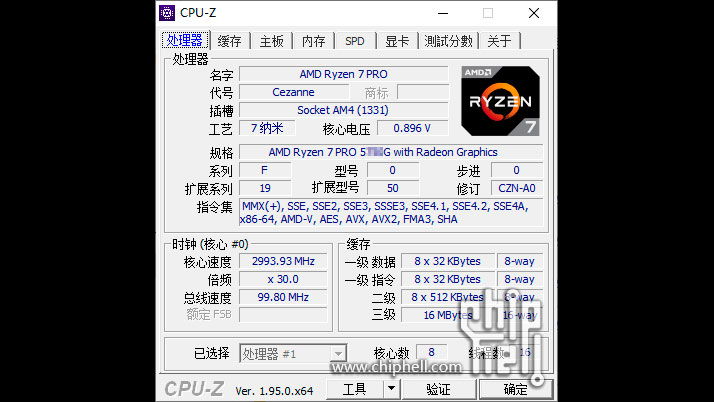There is no concrete date for AMD’s Zen 3 APU announcement, but the latest sighting of the Ryzen 7 Pro 5750G indicates that the official launch may not be too far off. Unfortunately, the first sighting of the desktop PC APU comes as a Pro model, which could mean that AMD will reserve its Zen 3 APUs for OEM systems only, just like it did with Renoir. That certainly wouldn’t be of much help to enthusiasts in these times of GPU shortages, but only time will tell us if these chips will also come to the DIY market.
The Ryzen 7 Pro 5750G is basically the direct replacement for the Ryzen 7 Pro 4750G and the Pro version of the Ryzen 7 5700G that showed up last month. A user from the Chiphell forums has shared an alleged CPU-Z screenshot of the Ryzen 7 Pro 5750G that gives us a small taste of what’s to come for AMD’s Zen 3 desktop PC APU chips. As with all leaked information, we should take the info with a grain of salt, but the specifications line up with our expectations.
While not explicitly present in the screenshot, we expect the Ryzen 5000 APUs to possess similar traits as the mobile Ryzen 5000 (Cezanne) counterparts. The Ryzen 5000 desktop APUs are still on a monolithic die, but they wield the famed Zen 3 cores that brought substantial IPC uplifts to AMD’s army. The Ryzen 5000 APUs lack support for PCIe 4.0 and will probably just use an improved Vega graphics engine, just like the Ryzen 5000 Mobile variants.
Ryzen 7 Pro 5750G Specifications
| Processor | Cores / Threads | Base Clock (GHz) | Boost Clock (GHz) | L2 Cache (MB) | L3 Cache (MB) | TDP (W) |
|---|---|---|---|---|---|---|
| Ryzen 7 Pro 5750G* | 8 / 16 | 3.8 | ? | 4 | 16 | 65 |
| Ryzen 7 Pro 4750G | 8 / 16 | 3.6 | 4.4 | 4 | 8 | 65 |
*Specifications are unconfirmed.
Zen 3 enabled Cezanne to sport up to twice the L3 cache compared to Renoir on the mobile parts. The same treatment goes for the desktop APUs, too. The Ryzen 7 Pro 5750G emerged with 16MB of L3 cache, twice what’s on the existing Ryzen 7 Pro 4750G. As expected, the 4MB of L2 cache remains unmodified.
In the case of the Ryzen 7 Pro 5750G, we’re looking at an eight-core 16-thread setup with a potential 3.8 GHz base clock. According to the forum user, the octa-core APU has a default full-core boost clock up to 4.05 GHz. However, the chip may boost over 4.75 GHz.
The author also claims that the Ryzen 7 Pro 5750G runs a bit cooler than the Ryzen 7 5800X. However, the Zen 3 APU has a stronger FCLK than Ryzen 5000 (Vermeer) processors. The Ryzen 7 Pro 5750G allegedly had its FCLK at 2,300 MHz, and there are rumors that engineering samples can even do 2,500 MHz.
The author bought his Ryzen 7 Pro 5750G for 2,750 yuan or $427.33. He seems to think that the retail pricing won’t be much cheaper than Vermeer.
